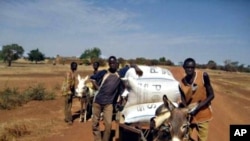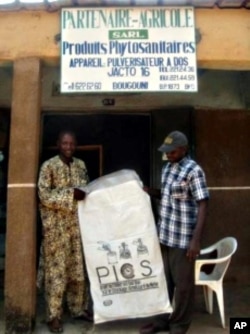Farmers around the world are discovering how airtight plastic bags can preserve their harvests and help them earn higher incomes. The simple, low-cost item can help protect crops in storage from pests, bacteria and fungi, all without the use of harmful chemicals.
As much as half of the food produced by developing-world farmers each year is ruined after harvest by pests, contamination or improper handling, according to the U.N. Food and Agriculture Organization.
It's a shocking figure considering that nearly a billion people in the world are chronically hungry.
Fast-breeding insects
In West Africa, for example, farmers can reap a bumper crop of cowpeas, only to lose much of it to an insect called a bruchid that multiplies while the crop is in storage.
Crop scientist Dieudonné Baributsa at Purdue University says each bruchid takes just a few weeks to go from egg to adult, which then lays another 40 to 60 eggs. In a matter of months, there are enough hungry bugs to decimate the stored crop.
Farmers usually have two choices. They can sell their crop immediately, before the infestation has spread too far. But at harvest time, everyone else is doing the same thing. Markets get flooded, prices plummet and farmers earn very little.
Killer beans
Or they can kill the bugs with pesticides. But many farmers do not know how to use the chemicals properly.
"They end up misusing or overusing the pesticide," Baributsa says, adding that poisonings and even deaths are disturbingly common. "They usually call them 'killer beans.'"
Baributsa is promoting a simple solution to "killer bean" poisonings and insect infestations: airtight plastic bags. Pour the cowpeas into one of these bags, seal it tightly, and any insects in it will soon use up the air and suffocate.
The bags are called PICS bags - short for Purdue Improved Cowpea Storage. They cost $2 each. Baributsa says that's about the same as pesticide treatment. And it's a fraction of what farmers can earn from an intact bag of cowpeas, especially when they can store them until after harvest time, when they can get a better price.
Not just any bag
But he cautions that not just any plastic bag will do. Liners for salt or sugar bags sold in African markets, for example, will not work.
"Those are low density, so they are very permeable to oxygen," Baributsa says. "So, if you put your cowpeas there, they will be destroyed because the insects will still access the air."
PICS bags, on the other hand, are completely airtight.
Building a sustainable market
And they are produced locally. Along with partners all over West Africa, Baributsa is working to create the entire supply chain for PICS bags, from manufacturers to retailers.
Building a market is critical, Baributsa says, because donor support for the project will not last forever.
"Many development projects give the farmers the bags," he says. "And then once the project ends, the farmer cannot find the bag on the market. We feel like that is not a sustainable approach to development."
A sustainable approach means building demand, too. So the project is advertising on the radio and through mobile phone videos in local languages.
Good for many crops
Around the developing world, from the Philippines to Nepal to Afghanistan, farmers are using bags like these to store rice, maize, cocoa, coffee and more. Because many bacteria and fungi need air to survive, the bags also help protect crops from spoiling.
The International Rice Research Institute (IRRI) is encouraging rice farmers in Southeast Asia to use the bags because they can increase total yields by about 10 percent. Plus, rice seed stored in these bags keep for six to 12 months longer than in other storage methods.
IRRI has teamed up with a U.S.-based company called GrainPro to market a version called Super Bags. GrainPro President Phil Villers says in addition to raising farmers' incomes, the bags can help fight world hunger.
"What doesn't get wasted means it's available to feed a hungry world," he says.
As the competition intensifies for resources to feed that hungry world, experts say it’s becoming increasingly urgent to preserve what farmers have already grown.





